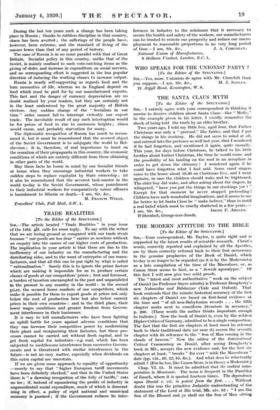TRADE REALITIES [To the Editor of the SPECTATOR.]
Snt,—The article headed "Trade Realities" in your issue of the 14th ult.. calls for some reply. To say with the writer that we are losing ground as compared with our trade rivals because "our goods are too dear" carries us nowhere without an enquiry into the causes of our higher costs of production. The implication in your article is that these are due to the inefficiency of our industry on the manufacturing and the distributing sides, and to the want of enterprise of our manu- facturers, and that all this can be put right by what is called "rationalization." Surely this is to ignore the prime factors which are making it impossible for us to produce certain claises of goods at our competitors' prices ; first and foremost., a burden of taxation unexampled in the past and unparalleled in the present in any country in the world : in the second pt.ce, the secured home markets of our competitors, which make it possible for them to export goods at prices not only below the cost of production here but also below current prices in their own countries : and in the third place, their lower wages conditions and greater freedom from Govern- ment interference in their businesses.
It is easy to tell manufacturers who have been fighting an uphill battle for years against adverse conditions that they can increase their competitive power by modernizing their plant and reorganizing their factories, but these pro- cesses cannot be carried out without fresh capital, and to get fresh capital for industries—e.g. coal, which has been subjected to meddlesome interference from successive Govern- .ments and is threatened with similar interferences in the future—is not an easy matter, especially when dividends on this extra capital are uncertain.
If we are given some approach to equality of opportunity -merely to say that "higher European tariff movements have been definitely checked," and that in the United States there is "a dawning recognition of the folly of tariffs," cuts no ice ; if, instead of squandering the profits of industry in unprecedented social expenditure, much of which is demoral- izing in effect, a policy of rigid national and municipal economy is pursued ; if the Government reduces its inter-
ferences in industry to the minimum that is necessary to secure the health and safety of the workers, our manufacturers can be trusted to restore our prosperity and reduce our unem- ployment to reasonable proportions in no very long period
of time.—! am, Sir, &c., J. A. CORCORAN. National Union. of Manufacturers,
6 Ifolborn Viaduct, London, E.G. 1.










































 Previous page
Previous page